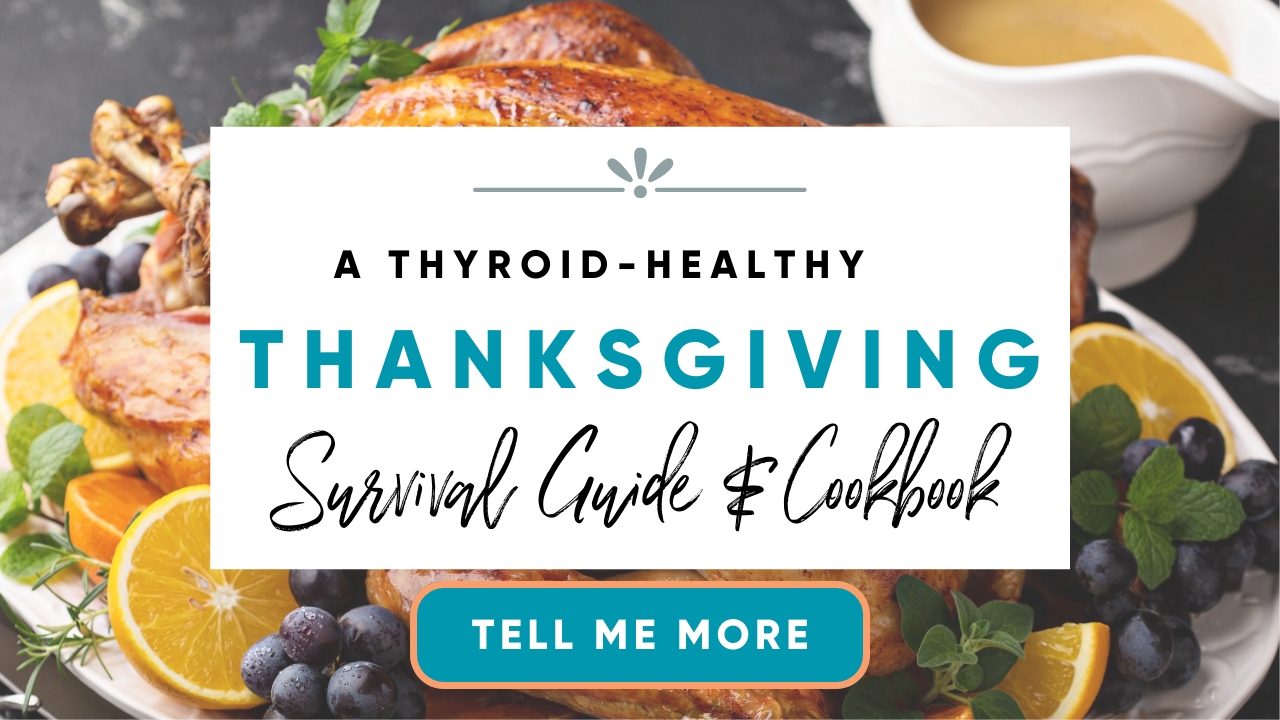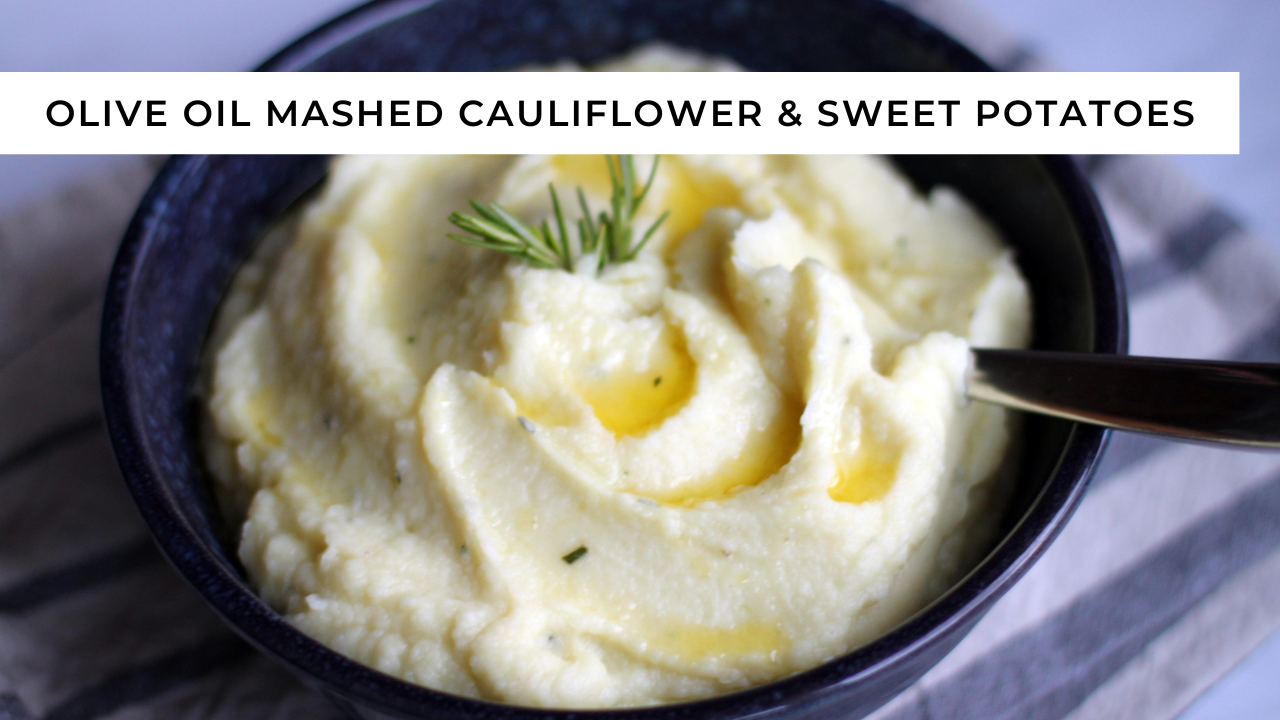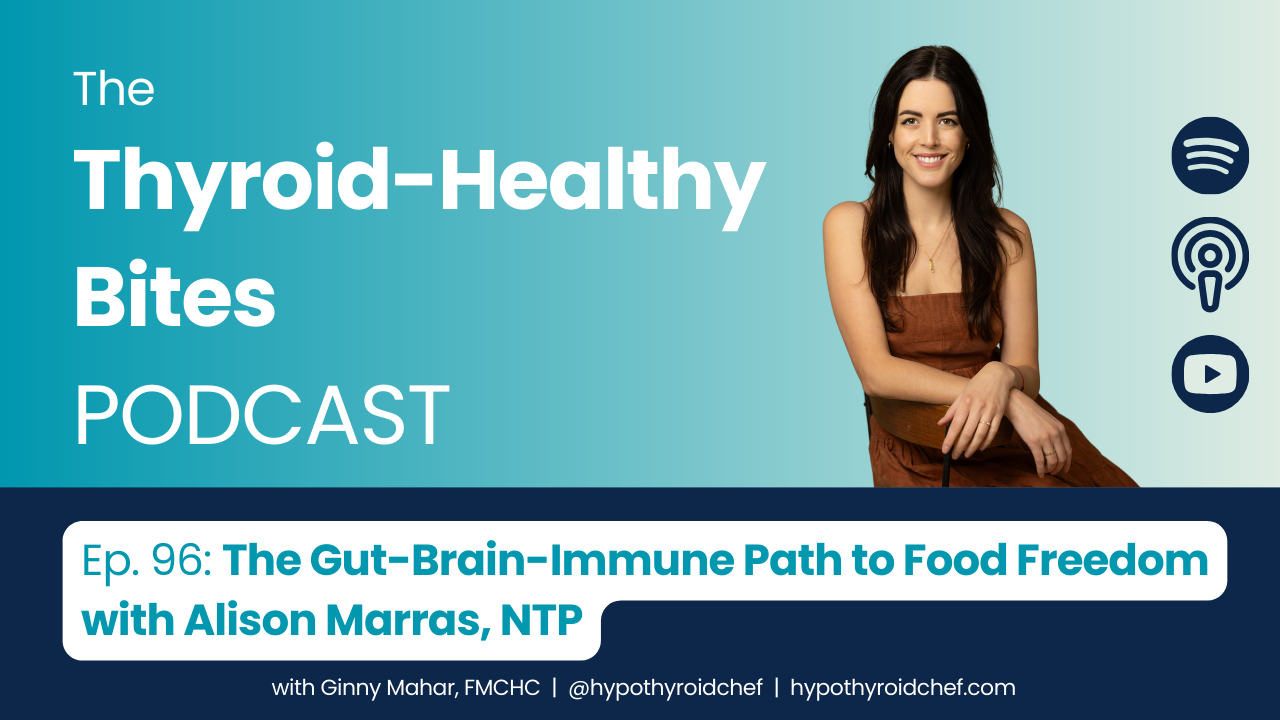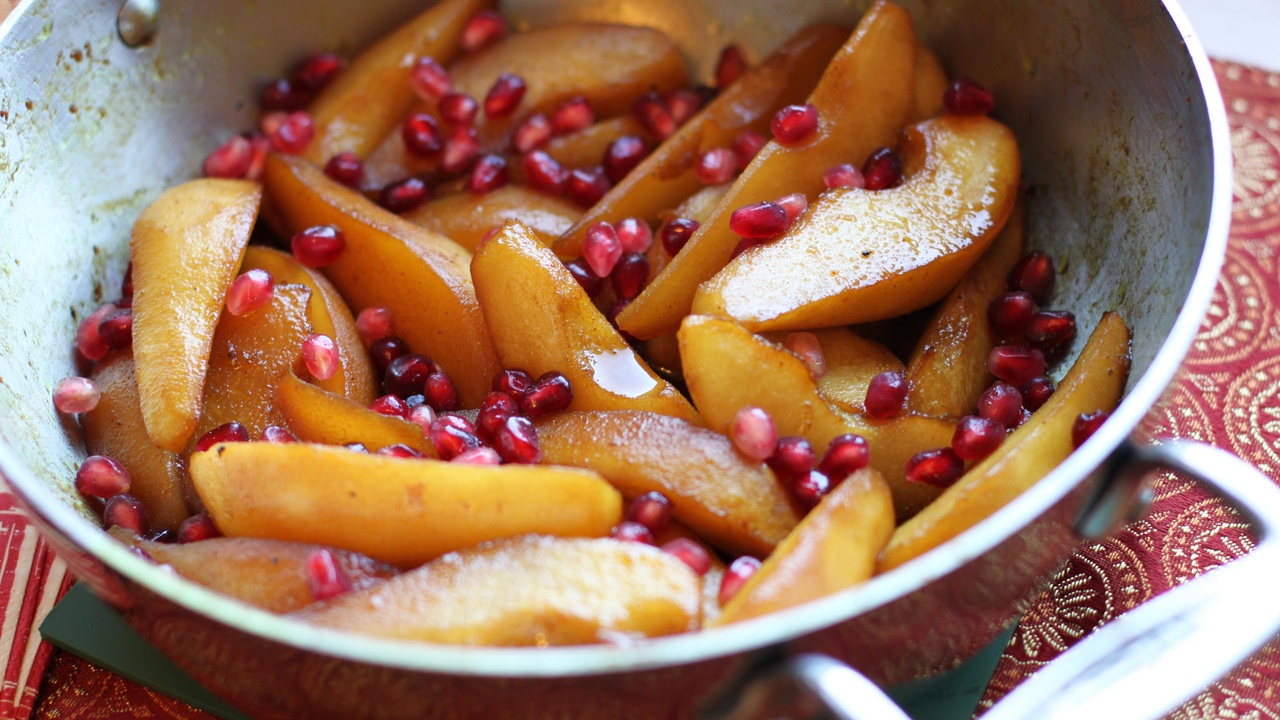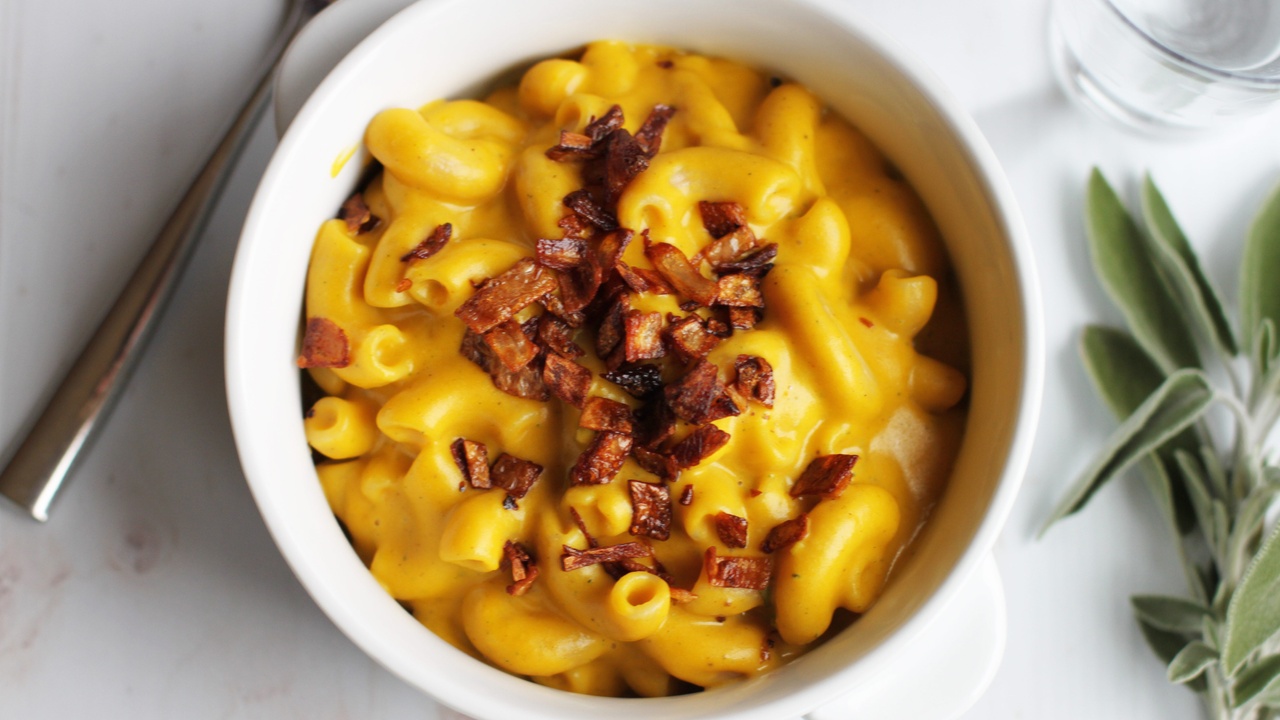Navigating Holiday Food the Thyroid-healthy Way

As Thyroid Thrivers, many of us become bloated, inflamed, brain-fogged, and downright symptomatic from eating things like gluten, dairy, sugar, and soy, and classic holiday recipes are loaded with these ingredients! So, how do we get through the holidays the thyroid-healthy way?
That's what we're going to cover in this blog post and episode of Thyroid-healthy Bites.
We'll Discuss:
- My personal story of fumbling my way to thyroid-healthy holidays
- Dealing with familial expectations and pressures around holiday food
- Making healthy boundaries around holiday food
- Sidestepping the temptation of holiday foods that make us sick
- Thyroid-healthy holiday recipe ideas and solutions
Full disclosure: Some of the links in this post may be affiliate links. As an Amazon Associate, I earn from qualifying purchases. Purchasing a product using one of these links will support my work at no additional cost to you. Please know that I only recommend products I wholeheartedly stand by.
Disclaimer: This information is for educational and inspirational purposes only. Always consult with your doctor or other qualified healthcare providers before making changes to your diet, health care, or exercise regimen.
Show Notes:
- The Thyroid-healthy Thanksgiving Survival Guide & Cookbook
- [RECIPE] Olive Oil Mashed Cauliflower & Sweet Potatoes
- Work with me as a Functional Medicine Health Coach
- Hypothyroid Chef Recipe Library
Podcast Links:
- Listen on the podcast page
- Subscribe on iTunes
- Follow on Spotify
- Subscribe on YouTube
- Subscribe on Google Podcasts
- Subscribe on Amazon Music
- Listen on Stitcher
Need Holiday Recipe Help NOW?
As the holidays near, food worries begin to swirl in the minds of Thyroid Thrivers...
How can I enjoy this meal that revolves around ingredients I don’t eat? How can I do this without having to make two versions of everything? How am I going to pull this off without either being disappointed by non-traditional recipes, or made sick by traditional ingredients?
The answer is simple: We do it with HELP.
- The right tools
- A solid game plan
- Tried and true holiday recipes your whole family will love
I created the Thyroid-healthy Thanksgiving Survival Guide & eCookbook to solve this conundrum for you.
- No more stressing about what the relatives will think.
- No more lame recipes that take a bunch of time and money, only to disappoint.
- No more Thanksgiving celebrations comprised of foods that make you sick.
Inside, you'll find my personal tips, tricks, hacks, and chef’s secrets to help you uplevel your Turkey Day Game, along with the tried and true recipes that I serve at my own Thanksgiving table. The best part is that all of them are family and kid-tested, and free of problematic ingredients like gluten, dairy, and sugar.
Whether you’re hosting the big event or just bringing a dish to pass, everything you need is inside this game-changing guide. Click the image below to take a look inside and see what's on the menu!
Fumbling My Way to Thyroid-Healthy Holidays
Even if we know which foods to avoid, even if we have experienced firsthand the negative impacts they have on our bodies, even if we’re normally very in tune with what foods we thrive on and which foods we don’t, it can be tough to stay on track during the holiday season.
Since 2015, I’ve been eating a thyroid-healthy diet, free of gluten, dairy, and refined sugar. Making these dietary changes has been foundational to getting my health back. Food has consistently been the most reliable tool in my toolbox. Avoiding the foods that hurt and incorporating the foods that help is what enables me to maintain, metabolize, move, motivate, and recover, despite Hashimoto’s.
With time, I’ve gotten to a good great place with it. I treasure the empowerment and vitality that comes from knowing which foods support my health, and which foods diminish it. But it hasn't been easy, and it definitely didn’t happen overnight. One aspect of thyroid-healthy eating that took the longest to get the hang of was HOLIDAY FOOD.
As a chef and cooking instructor, these dietary limitations temporarily turned my world upside-down, including my approach to holiday cooking, and my attitudes about it. Sure, I could see and feel how my health improved almost immediately from these thyroid-healthy dietary changes, but I still had to fumble my way through the first few holiday seasons before I figured out what worked.
Food, and especially holiday food traditions, have deep emotional roots. How could it possibly feel like Thanksgiving or Christmas without Grandma Louise’s pumpkin pie, my brother’s homemade Chex Mix, or that Michigan favorite: cheesy hashbrown casserole? Maybe you have your own food traditions that have been with you since childhood.
We don't just wake up one day and say, "Oh well! I can never eat those beloved recipes again. No biggie." We kick and scream and cry and deny and pretend it's not happening. We try to see if we can get away with it "just one day a year." For a lucky few, maybe we can. For the rest of us, we pay a dear price.
It took time, trial, and error. It took a grieving process. It took a lot of self-acceptance, and some mindset work, but I no longer face this dilemma when the holidays roll around. Here are my secrets...
What works for me and my family:
Some holiday food traditions are okay to let go of. For me, it was making 8 kinds of Christmas cookies and green bean casserole. Nobody living under my roof cared about or really wanted either of those things. The cookies were an absolute bombardment of refined carbs and sugar. Green bean casserole is full of processed food ingredients we would never eat on a normal basis. I was clinging to them based on nostalgia, and past traditions that I grew up with. I believed that the holidays would never feel complete without them because they had always been a part of my life. When I let these food traditions go, not only did the sky not fall, but it made room for new holiday traditions that were more aligned with my special dietary needs and the values of my own family. It's been fun embracing the idea that I get to put my own thumbprint on holiday food traditions for my family. Someday, my son will get to put his thumbprint on it for his family as well.
Some holiday food traditions are worth sticking with, and either finding a way to re-create without problematic ingredients or making two versions of them. It's okay to have those traditional must-haves. Knowing what they are brings a lot of clarity to holiday menu planning.
Sometimes, the best solution is finding an alternative or replacement. Delicious mocktails can replace the abundance of alcohol that accompanies many holiday celebrations. A made-from-scratch green bean casserole can fulfill that craving without consuming a bunch of dairy, gluten, preservatives, and GMOs. An entirely new Thanksgiving dessert may be better than a disappointing gluten- and dairy-free rendition of Grandma's Pumpkin Pie. When we allow ourselves to reimagine holiday recipes, we can begin to find options we love...that love us back.
Adopting non-food-related holiday traditions is a beautiful way to connect with the holiday spirit and make family traditions richer and more meaningful. Examples include creating and burning a Yule Log or crafting a "Gratitude Tree" at Thanksgiving (I demonstrate this one in the video above).
Finding your way to thyroid-healthy holidays is a dance, and that dance belongs to YOU. It may be awkward at first, so don't be too hard on yourself. This process takes time, but you will discover your non-negotiables and your healthy alternatives along the way. While nothing can replace nostalgia, building new holiday traditions doesn't take as long as you might think!

Making and burning a Yule Log on the Winter Solstice has become one of our most treasured holiday traditions.
Here's what didn't work for me:
I tried bargaining, telling myself, “It’s just one day a year, right?” Then, I would eat everything during the holiday festivities. Of course, this not only made me feel awful and flared up with a bunch of symptoms, but it also back-tracked my health progress and sent me down a slippery slope of wanting more of those foods.
I tried making separate menus, preparing a few things I could eat, and then making all the other traditional stuff for my family. I would tell myself, “I’ll just not eat that traditional stuff. All I need is turkey, potatoes, and salad.” Yeah, I failed that test every time.
I tried a lot of crappy recipes. There were so many recipes I tested, and some of them were great, some were okay, and some were a downright bummer. This was a necessary part of the process, but I would have loved it if someone would have said, "Hey, I've already done all this work for you. Here's a stack of recipes you can trust..."
A peek inside The Thyroid-healthy Thanksgiving Guide
It has taken time, self-awareness, self-acceptance, forgiveness, and persistence, but I’ve learned a few things along the way about navigating the holiday season WITHOUT going off the thyroid-healthy rails.
My heartfelt advice to you:
- Stay in tune with your body. Accept and embrace your new needs. Love your body enough to listen to the feedback it’s giving you, and then honor that feedback.
- Let the perfectionism and guilt and being way too hard on yourself go. Just keep going, love. You'll get there. Ask for help and you'll get there faster.
- This journey isn't about sticking to a "diet" or eating perfectly. It's about adopting a lifestyle of giving your body the food it needs to thrive. This is how we can avoid a spike in symptoms or antibodies, which can result from even "just one day" of bombarding yourself with inflammatory foods.
- Finding a thyroid-healthy path we can stick with takes both self-regulation, self-trust, and solutions for how we can enjoy our food while still taking the best possible care of our bodies.
In the next section, I'll share some pragmatic tips that you can cherry-pick from to help you through the holidays. But before we move on, my wish for you this holiday season is that you dance your way through it. Even if you look like Elaine from Seinfeld for a while...
Eventually, you’re going to be dancing the tango, so have patience, have faith, and know that as long as you stay the course, you got this! If you need help, I’m here for you.
Dealing with Holiday Food Expectations
Thyroid-healthy eating generally requires flexibility, and for most of us, it requires change. There are those common dietary triggers most of us find we need to avoid to feel well, like gluten, dairy, sugar, and processed foods. Then there are more bio-individual sensitivities, like nightshades, eggs, or legumes. Ultimately, what you can and can't tolerate depends on YOU. It's different for everyone. The common path we walk is having to figure out what those "avoid" foods are and then adapt our way of eating.
Depending on how you eat now or how your family eats, this can be a significant departure from your norms. At holiday time, family traditions are literally ON THE TABLE. So what can we do when Great Aunt Ida insists you have a piece of her famous Pumpkin Pie? Or Uncle Eddy declares after a 6-pack of beer that the whole gluten-free thing is a bunch of hogwash?
As Thyroid Thrivers, it sometimes requires that we do have to be that person, as in the one with some special dietary needs. Some of our family members may be less than understanding, especially when they haven't experienced what it means to live with a chronic, invisible illness like hypothyroidism or Hashimoto's.
Bottom Line: The only opinion that matters here is yours. It’s your body, health, and your right to choose what goes into your mouth and what doesn’t. If they're worth a place in your life, they're still going to love you, no matter what you do and don't eat.
Tips for handling holiday food expectations from others:
Let yourself off the hook from other people's expectations. This is a good general mindset shift to make as a Thyroid Thriver, and one that applies to your whole life. They don’t live in your body, and they don't have to live with the consequences of the problematic foods they may be asking you to eat or prepare at holiday time.
It's your health, your call, and ultimately, your responsibility. Others might not understand your needs, and they may not be able to get out from under their own opinions long enough to express genuine curiosity about your health. I know how hurtful and disappointing that can be but remember: That’s their problem and their business, NOT YOURS. Your business is taking care of YOU, and the bottom line is that nobody else is going to do that for you, so you have to do it for yourself.
You don't owe anyone an explanation. You're not obligated to explain your dietary choices or educate those less-than-sensitive relatives. You don’t have to convert them to your way of thinking about health. So, why waste your precious energy doing that? You do you. Fill your plate as you see fit. It’s your body and your health. You're the one who endures the consequences of food choices you know aren't right for you.
Sometimes, less is more. If you want to converse with people about your food needs and choices, that's your call. I am an advocate for inviting your trusted loved ones into your healing journey, especially your spouse and children, if you have any. Sometimes, though, at those big holiday gatherings where things like political debates can easily devolve into legendary arguments, it's best to avoid getting into big conversations about your food needs and choices with anyone other than those select few who you know will be curious, respectful, and supportive.
Before engaging in a conversation like this, ask yourself, do I want to spend the next 15 minutes explaining and defending my choices to those who have no idea how hard or how important this is? Or do I just want to enjoy my loved ones and eat my meal in peace?
Personally, I've found it's best to keep things short and sweet when the topic of my dietary needs comes up at big holiday gatherings. It helps to have some canned responses at the ready.
If you find yourself getting strong-armed by Aunt Ida to eat that famous pumpkin pie, or otherwise pressured to eat foods that aren't right for you, here's what you can say:
- "No, thank you." (Oftentimes, this is all it takes.)
- "I just feel better if I don’t eat ___(gluten/dairy/etc.)___."
- "Sorry, I don't do ____(gluten/dairy/etc.)____."
- "Sorry, I'm on a restricted diet right now."
- "Sorry, I'm ___(gluten/dairy/lactose/etc.)___ intolerant. It makes me get sick."
- "It's not that I don't want to. It’s just that for me, it’s not worth it."
What if you're afraid of disappointing people?
The people who genuinely love and care about you and want what’s best for you would never want you to cause yourself harm to protect their feelings. Put yourself in their shoes. Would you ever want someone to eat something that would make them feel unwell just because you made it? I’m going to guess your answer is NO because you’re a Thyroid Thriver, so this is something you inherently get. You’ve developed compassion and empathy for what it’s like to have dietary needs and restrictions.
It's okay to have needs. It's okay not to want to talk about your health issues at Thanksgiving dinner. It's okay to turn down that glass of egg nog or scoop of stuffing. If you wouldn't want someone else to eat something that was going to make them sick to spare your feelings, why do that to yourself?
Handling Our Own Expectations and Desires Around Holiday Food
There’s that little kid inside each of us who just doesn’t feel like a holiday meal is complete without Grandma’s mac and cheese, your mom’s special cookies, or crazy Uncle Eddie’s egg nog.
There’s no way around it. We have to grieve. I highly encourage you to journal, talk to someone about it, and cry if needed. Those tears help wash away our clinging to the past so we can let go and move forward into a bright and healthy future for ourselves.
Having special dietary needs and restrictions IS hard. It IS sad. I promise you, it will get easier with time, but on some level, it will probably always be a bit of a tender spot. I know it is for me. Love yourself tenderly through it. Tell someone who loves you, “I miss being able to eat this. It hurts. It’s hard.”
Can we have the courage and the grace to sit with that? To feel the grief when it comes up? When we do, what’s on the other side? Acceptance. And reality is much easier to work with when we stop fighting it and arrive at acceptance.
This is what your body needs. Things are different now. You still have choices. You can find solutions. You can feel well. But you must also accept and lean into this 'new normal' in order to get there.
Remember: You’re not alone.
If you feel alone in this, think about the millions and millions of others out there with dietary restrictions. Maybe they have food allergies, diabetes, heart disease, or autoimmune diseases. They’re out there too. They, too, are facing holiday celebrations with grief, courage, acceptance, trepidation, and everything in between.
Think of them this holiday season when you're feeling frustrated, sad, or alone. Send them love and kinship, and feel that love and kinship karmically returned to you by this web of other brave health warriors. We know what it's like, don't we? We want others to succeed and find health despite their illness. Can we give ourselves that same acceptance, compassion, and encouragement?
Others who don't understand what it means to live with a chronic illness may be insensitive. You may not always get the empathy and understanding you deserve. It’s okay to look elsewhere for the support you need. It’s okay to decide other people (including your relatives) don’t get to dictate how you live your life. It's okay to be sad, to cry those tears, and to have needs. You do you, love. You take care of yourself. The only way out of this is through.
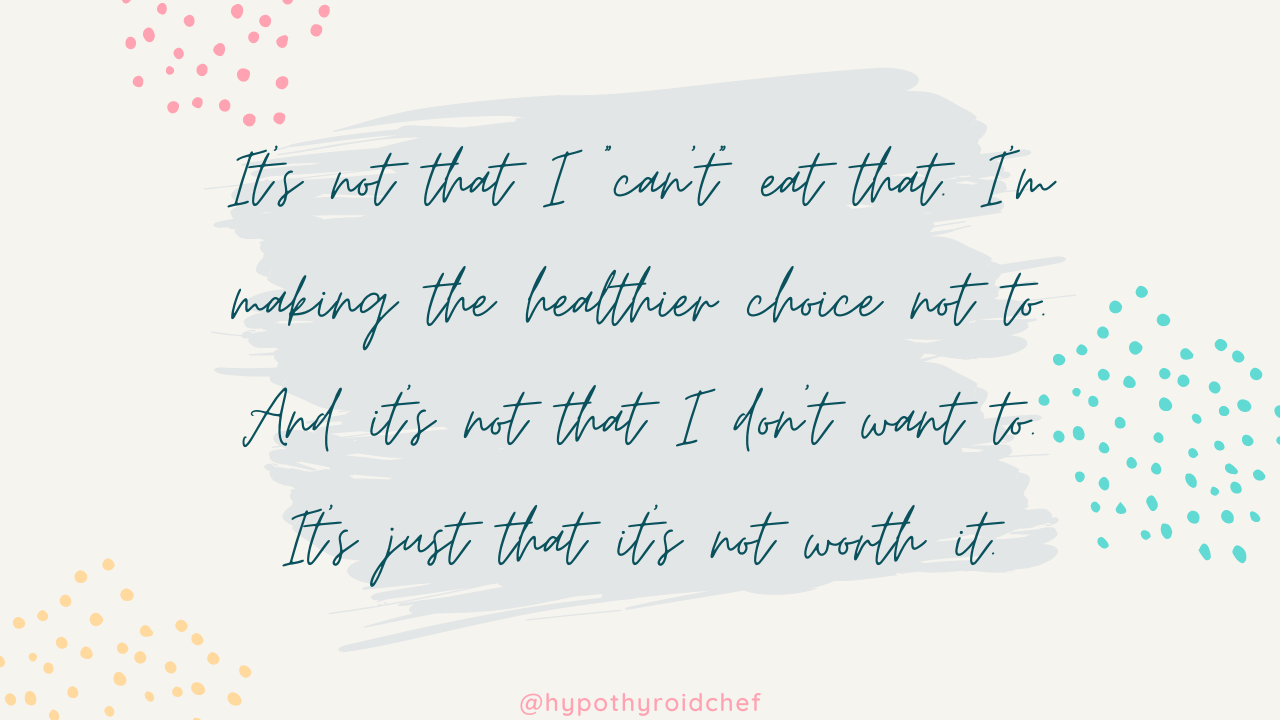
Making Healthy Boundaries Around Holiday Food
First, let's define what making a boundary means: It means being aware of what is and is not acceptable and then normalizing saying NO. It means doing what is best for you and knowing that it is not your responsibility to sacrifice yourself for others.
Many of us were raised with the belief that the needs and feelings of others come first. As women, eons of human survival have hardwired us with programming that has enabled us to care for and nurture our families by putting their needs first. In other words, prioritizing our own needs and making healthy boundaries is something we may have to work on. It may take a bit of deconstructing past behaviors and beliefs. It may not come naturally, and it may be awkward, especially at first.
The image I often think of is throwing oneself down on the train tracks for the needs of someone else. When I catch myself doing that now, that visual is my little inner red flag. It has taken a lot of practice, but I’ve gotten a lot better since my thyroid diagnosis at making healthy boundaries and saying NO.
Holy cow, what a good feeling! It's a tremendous weight lifted when you have the awareness, skills, and self-respect to say, “NO, actually, my needs matter. So, do yours, and so do mine.” Then, we can go about finding a way to honor everyone's needs at the table, including yours.
Just like I thought the sky would fall if I didn't make eight kinds of Christmas cookies or prepare green bean casserole from a can every Thanksgiving, I thought the sky would fall if I said, "No, actually, I don't eat that."
Amazingly, the sky didn't fall. Instead, what I found is that the vast majority of my family and friends were incredibly kind, supportive, and accommodating. As I said in the previous section, the people who love and care about you WANT you to be healthy and okay. Giving them the information they need about your needs and requirements helps them play a part in that.
You Might Also Like: Inviting Your Loved Ones to Your Healing Journey
How to Make Healthy Holiday Food Boundaries
First, identify your hard line. What is your absolute NO when it comes to food? Is it gluten, dairy, nightshades? Is it all three? Is it something else entirely? Identifying what you absolutely cannot eat clarifies what your firm boundaries need to be around food and where you can have wiggle room.
Second, identify and leverage your flexibility. What are the foods you can have occasionally? Can you tolerate some dairy? Some grains? Some eggs? If you know what your thresholds are with certain foods, the holidays can be a good time to take advantage of them.
Where do you have wiggle room and flexibility? Can you leverage that at holiday time? Doing so gives us more food freedom, which can boost our enjoyment of those holiday feasts. This, in turn, helps us find a sustainable path to a lifetime of thyroid-healthy eating.
Don't be wishy-washy about it. When the host of a holiday gathering is cool enough to ask you what your dietary needs and restrictions are, don't be shy about it. Tell them. You've identified your hard line, so share what that is clearly and succinctly. If you like, you can offer to bring a dish that works for your dietary needs, so the host doesn't have to provide it.
Use the words, "I don't eat _______, " rather than, "I can't eat _______." According to the research of Dr. Vanessa Patrick, you can increase the likelihood of sticking to your health goals by saying "I don't eat that" versus "I can't." "I can't" implies that you are a victim, being denied and forbidden certain foods, whereas "I don't" implies that you are an empowered and informed person dedicated to your ongoing optimal health.
This is important messaging both for others and for your subconscious belief system.
So, how much more likely are you to stick with your goals by saying, "I don't eat _____?"
According Dr. Patrick's study, you are EIGHT TIMES more likely to succeed than those who say, "I can't eat ______." WOW.
Don't feel guilty. Just be grateful. Instead of feeling guilty when someone makes special accommodations for you, replace it with gratitude. What a beautiful display of family or friendship, acceptance, compassion, and kindness. You are loved! So, stop agonizing over it and instead say, "Wow! Thank you so much! That really means a lot."
What if I am on a strict healing protocol like AIP?
This is somewhat of a 'special case' scenario. Healing or therapeutic dietary protocols like Paleo or AIP can be incredibly effective when we are trying to heal our guts and recover from a more serious health situation due to factors like autoimmunity or intestinal permeability.
If this is where you are, I'm rooting for you and have been there many times. Elimination-phase AIP has become a tool I return to as needed when my health starts to go sideways. It's not easy, but it has always been 100% worth it. The food freedom I have now have, in large part, has come from those times when I had to buckle down and do a few months on an elimination diet like AIP to heal or reset my gut. I even used it with great success to reduce inflammation and recover from frozen shoulder and shoulder surgery-- a common complication of Hashimoto's.
This high level of dietary restriction from strict AIP, Paleo, or another 'elimination diet' may be necessary temporarily. My advice: If you and your healthcare provider feel it's acceptable for you to choose when to start something like an elimination diet, DO NOT start during the holiday season. If this flexibility is possible, increase your likelihood of success by choosing a simpler time of year than the holidays. Timing matters. Set yourself up for success.
If you do need to be on an elimination diet during the holidays, you may want to take a different approach to the holidays this year. Consider bringing your own food or opting for a small and intimate AIP celebration at home. You are doing something that is difficult. You are working hard to make a worthwhile investment in your health. Don't undermine your own efforts. Taking a different approach this holiday season may be the best course of action to help you stay on track.
While this can feel like a bummer, keep in mind that this is not permanent, and elimination diets are not meant to be long-term. The long-term goal is to reintroduce most foods. Maybe this holiday season, the best thing for your health is not to be surrounded by a smorgasbord of foods you currently need to avoid. If so, that's okay. Remember: It's not forever. The whole point is to get you to a place of better health and more food freedom.
Recipes to Help You Sidestep Holiday Food Temptation
Let’s talk about facing what is perhaps our greatest challenge when it comes to thyroid-healthy holiday choices: OUR OWN DESIRES!! Because, let's face it, gluten, dairy, and sugar taste good!
I use the word sidestep because avoiding temptation is impossible during the holidays. Sidestepping is another way of saying hacking or strategizing our way around those inevitable temptations. What it comes down to is time, trial, and error so that we can build self-awareness around what works and what doesn't for us as individuals.
First, it helps to figure out when to lean on substitutes and when to choose alternatives.
A substitute recipe is similar to the original but without your hard-line dietary exclusions. An example is stuffing made with gluten-free bread and ghee instead of butter so that it's gluten and dairy-free.
An alternative recipe means making something else entirely. For example, a crustless pumpkin pie can be a gluten-free substitute for regular pumpkin pie but isn't exactly a re-creation of the real thing.
This pumpkin pie example hits home for me. I like crustless pumpkin pie, but it feels lacking on a special feast day like Thanksgiving. In this case, I prefer an alternative recipe, and I've created one that happens to be gluten, dairy, and refined sugar-free. I've included this recipe for Pumpkin Panna Cotta with Pumpkin Seed Brittle (pictured below) in my Thyroid-healthy Thanksgiving Guide.
Stuffing is a similar scenario at my table. I haven’t found a gluten-free stuffing replacement recipe I like, so I diverted and came up with an alternative Wild Rice Dressing that has sausage, sage, pecans, and cranberries. I love it, and it’s nothing like bread-stuffing, which makes it easier for me to enjoy. This recipe alternative, also found in my Thanksgiving Guide, is my thyroid-healthy solution.
Now, my son will not be happy without regular bread stuffing, and that’s okay with me. I don't want him to miss out on his favorite Thanksgiving side, so I make the regular stuff for him. I’ve got my wild rice dressing that I adore as an alternative. My plate isn’t missing something, and neither is his. I'm not tempted to eat the traditional stuffing because I have a delicious alternative, and everyone is happy.
That's one menu item I choose to make two versions of, but it's what works for my family, and the gluten-tolerant people at the table enjoy both options.
Now, mashed potatoes, on the other hand, are ESSENTIAL in my book. And it’s essential that they taste like the real thing. The same goes for gravy. So I created a recipe for The Ultimate Gluten-free, Dairy-free Mashers and Gravy.
If I don’t mention they’re dairy-free, no one notices they’re not made the traditional way. So...why mention it?!
Now, that’s what works for my family and me. If you and your family have a lot of dietary restrictions, or if you’re on a more strict healing protocol, you may want to have a mashed potato alternative that is nightshade-free.
If this applies to you, check out my recipe for Olive Oil Mashed Cauliflower and White Sweet Potatoes. It's so delicious, and while it doesn’t taste exactly like the real thing, it’s a solid alternative. Not only that– it’s gluten-free, dairy-free, Paleo, AIP, and vegan-compliant.
In some cases, a substitute is just the ticket. I find mocktails to be an especially effective substitute when trying to minimize alcohol consumption - which happens to be one of the best choices we can make, especially for our gut health.
Avoiding alcohol can be hard during the holidays, but there's magic in a good mocktail. The surprising and delightful thing about weeding out some of these old habits and traditions is that it allows room for new ones to blossom. My Cranberry Ginger Fizz, pictured below, is a mocktail I often make for guests and a perfect tradition for the holiday season.
Get the recipe in my Thyroid-Healthy Thanksgiving Guide.
Further Reading: 5 Reasons Alcohol is Problematic for Thyroid Thrivers
Something about having a delicious beverage to sip on while cooking or mingling can work wonders when it comes to abstaining from alcohol. This one makes me forget entirely about those tempting alcoholic options.
If something higher-octane is wanted for the celebration, go for the best possible choices, like an organic, low-sulfite, additive-free wine like those from Dry Farm Wines. I order a case every holiday season to share with friends and family or give away as gifts.
You can also spike this Cranberry Ginger Fizz with a splash of vodka for guests who prefer that. With alcohol, abstinence is sometimes easier than moderation, so it's all about finding what works for you.
Incorporating New Holiday Traditions
Another effective way to sidestep holiday food temptation is by replacing some holiday food traditions that no longer align with your health goals with non-food-related holiday traditions.
- Go for a holiday walk or drive
- Create a gratitude tree (see a demo in the YouTube video above)
- Light a non-toxic candle
- Make and burn a Yule Log (pictured above)
There are so many ways to make the holidays richer and more meaningful that don't require consuming food or drinking alcohol.
Here's an example: My son and I like to decorate Christmas cookies, but as I've learned, he and my husband don't really like eating them. I enjoy them, but they're not really aligned with my health goals. Still, I don’t want my son to miss out on that fun and special holiday cookie-decorating tradition. So, now, what we do instead is get a pre-baked Gingerbread house kit and decorate it together.

They’re so cute; they make a sweet Christmas decoration for the house that we get to enjoy all season, and while they do contain gluten, dairy, sugar, and lots of other processed food ingredients, they’re not really meant to be eaten. At least I'm not tempted to eat it, which is helpful. My son may eat a few of the candies, but it's far less sugar impact and temptation than piles of cookies lying around.
We get to enjoy the tradition and the decoration while sidestepping the temptation of those homemade Christmas cookies. It's a Christmas miracle!
Here's what doesn't work when it comes to sidestepping temptation:
- Self-denial, as in, I just won’t eat that.
- Self-harm, as in, I’ll just eat it and pay the consequences.
- Self-loathing, as in, I ate it, and now I’m going to punish myself with extreme fasting, restriction, exercise, or negative self-talk.
It's important to practice grace and forgiveness with yourself at holiday time as there will probably be some slip-ups. It happens to the best of us. We over-indulge, we get accidentally "glutened," we succumb to temptation, or maybe we choose to throw caution to the wind.
If this happens, don’t beat yourself up. Lean on those diet and lifestyle practices that help you recover. Lots of water, walking, some digestive enzymes if that helps you, healing foods like bone broth, or detoxifying foods like beets or blueberries. Love yourself back to your happy, healthy place. And keep going. Don’t let one blip or slip up take you permanently off track. Before you know it, you’ll be thriving again.
That’s the journey. It comes with ups and downs. Nobody's perfect, and if there's a time to do some mindful indulging, the holidays are it. But if you're a Thyroid Thriver, you’ve probably learned that some indulgences now come at a price not worth paying.
In Conclusion...
The holidays are loaded with foods and drinks that diminish rather than support your health, presenting you with difficult choices. When it comes right down to it, what fun is it to feel awful throughout the holidays? Making thyroid-healthy updates to your holiday recipes and traditions can be a necessary, albeit emotionally heavy, process, especially at first.
We all have days when we wish we could eat and drink what everyone around us was eating and drinking. But genius means working within limitations, and there are so many delicious ways to celebrate within our thyroid-healthy limitations. So, define your hard line, leverage your flexibility, and find ways to replace old and outdated traditions with ones that align with your health needs, goals, and values.
I’ll leave you with this final thought: Joy and celebration are what the holidays are all about, but no amount of deliciousness can make up for feeling crummy. Nothing tastes as good as true wellness feels.
I hope this has inspired you and given you many ideas about how you can make some strides this year toward your own vision of thyroid-healthy holidays.
If you need help and support, I am here for you!
- Find support in the Thrivers Club, where you'll have direct access to me, an awesome support community, and loads of resources to help you thrive!
- Browse my collection of thyroid-healthy holiday recipes.
- If you’re ready to slingshot your way to thyroid-healthy holidays, starting with Thanksgiving, check out my Thyroid-healthy Thanksgiving Guide. It puts my years of trial, error, and recipe testing instantly in your hands!
Wishing you happy holidays and the best of health!

P.S. Need More Thyroid-Healthy Holiday Help? I've got you covered! Check out this featured holiday content:
- 25 Thyroid-Healthy Holiday Recipes
- Tips for a Thyroid-Healthy and Stress-Free Thanksgiving
- Navigating Holiday Food the Thyroid-Healthy Way
- 3 Easy and Refreshing Thyroid-Friendly Mocktails
- Travel-Friendly Foods & Tips for Thyroid Thrivers
- Check out the recent Rent. article I was featured in: Healthy Holiday Eating Tips to Keep You Disciplined | Rent. Blog
Subscribe to my free newsletter for fresh recipes & lifestyle tips, delivered weekly, and receive a free gift!
By submitting this form, you agree to receive ongoing updates from Hypothyroid Chef


